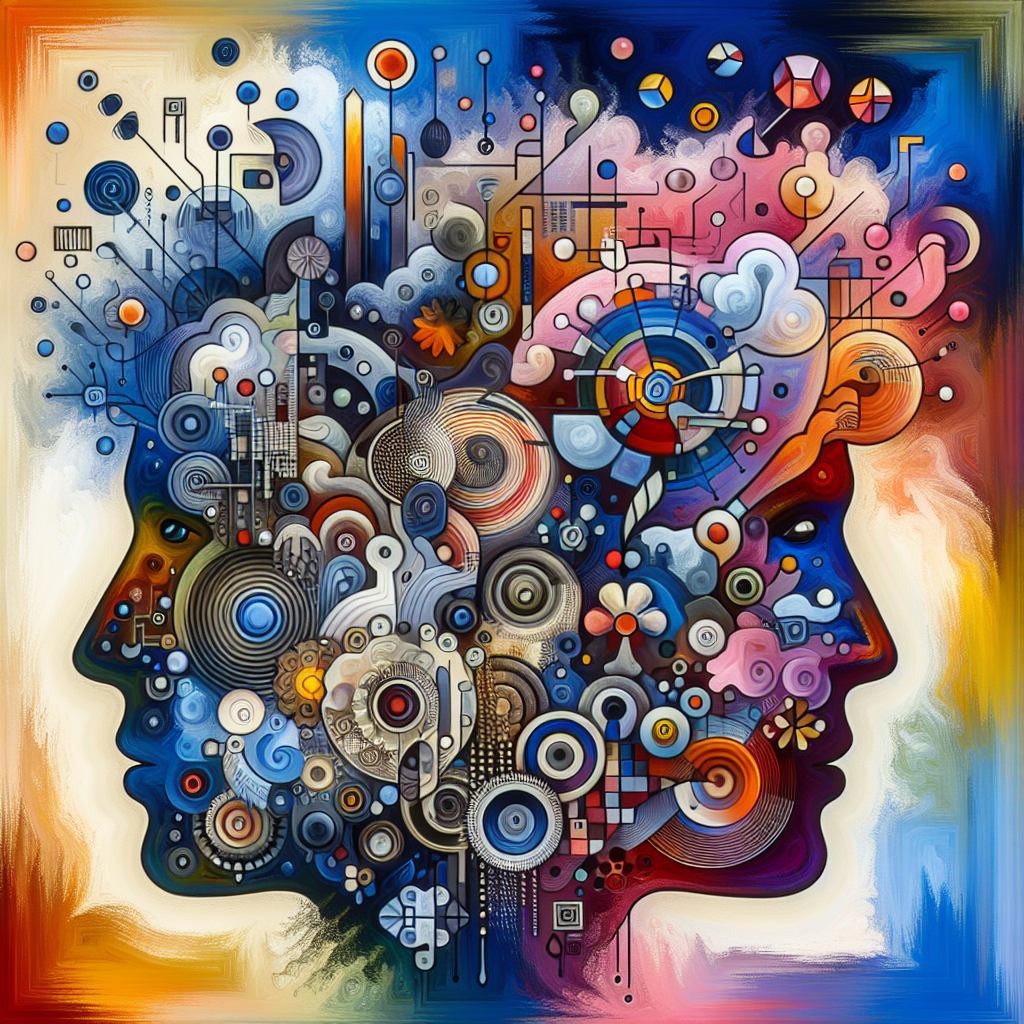-
Table of Contents
Introduction

Identity encompasses the qualities, beliefs, personality, looks, and expressions that make a person or group. It can be considered the framework of individuality and is shaped by various factors including genetics, environment, upbringing, and experiences. Identity plays a crucial role in how individuals perceive themselves and how they are recognized by others. It can include aspects like gender, nationality, ethnicity, religion, and social roles, each contributing to an individual’s overall sense of self. Identity is not static; it evolves and changes throughout a person’s life as they encounter different experiences and integrate new information and perspectives. This dynamic nature of identity allows for personal growth and adaptation, reflecting the complex interplay between individual choices and societal influences.
Feeling Stressed or Recognize These Signs?
Talk to a Therapist NowThe Evolution Of Personal Identity In The Digital Age
Identity, a complex construct that has evolved significantly over centuries, has entered a new phase of transformation in the digital age. Traditionally, personal identity was shaped by physical and social contexts such as family, community, culture, and nation. However, with the advent of digital technologies, the boundaries and expressions of identity have expanded, leading to new opportunities and challenges.
The digital age has introduced a plethora of platforms where individuals can express, explore, and reshape their identities. Social media, online forums, and virtual worlds offer spaces where one can present varied facets of their persona, often tailored to different audiences. This multiplicity of online identities can be seen as an extension of the self, allowing for greater flexibility in self-presentation. Yet, it also raises questions about the authenticity and coherence of personal identity when mediated through digital interfaces.
Moreover, the digital environment fosters a culture of immediacy and visibility, where personal experiences and opinions are instantaneously broadcasted and scrutinized. This public exhibition can influence personal identity, as individuals increasingly reflect on how they are perceived online. The feedback loop created by likes, comments, and shares can serve as a mirror reflecting a crowd-sourced version of one’s identity, which might differ significantly from their offline self. This phenomenon can lead to a dissonance between one’s online persona and their real-world identity, complicating the internal sense of self.
Transitioning from the individual to the societal level, the digital age has also democratized the creation and dissemination of information, allowing more voices to be heard. This shift has enabled marginalized communities to craft and circulate narratives that challenge mainstream and often monolithic representations of identity. Consequently, the internet has become a pivotal tool in social movements aimed at redefining identity politics and asserting the complexity of personal and collective identities.
However, the digital landscape is not without its pitfalls. The same tools that empower individuals to express their identities can also be used to manipulate and surveil. Data collected from online interactions can be used to profile individuals, infringing on privacy and autonomy. Furthermore, the rise of artificial intelligence and algorithms can lead to the reinforcement of stereotypes, as these technologies often rely on biased datasets that do not accurately reflect the diversity of human identities.
In response to these challenges, there is a growing discourse on digital ethics and the need for regulations that protect personal identity in the online world. Advocates argue for the development of technologies that respect user autonomy and promote inclusivity. Additionally, there is an increasing awareness of the importance of digital literacy, so individuals can navigate the online world more safely and understand the implications of their digital footprints.
In conclusion, the evolution of personal identity in the digital age is marked by increased complexity and contradiction. While digital technologies offer unprecedented opportunities for self-expression and community building, they also pose significant risks to privacy and authenticity. As we continue to integrate these tools into our daily lives, it becomes imperative to critically assess their impact on our understanding of identity and to strive for a digital society that respects and enriches the human experience.
Cultural Identity And Globalization: Challenges And Opportunities
Identity, particularly cultural identity, is a complex and multifaceted aspect of human life that shapes how individuals perceive themselves and interact with the world. As globalization accelerates, it brings both challenges and opportunities to cultural identities worldwide. This phenomenon of increasing worldwide interconnectedness, facilitated by advancements in technology, transportation, and communication, has profound implications for how cultures evolve, merge, and sometimes clash.
One of the primary challenges posed by globalization is the fear of cultural homogenization. This concern is rooted in the observation that dominant cultures, often those of economically powerful nations, can overshadow and diminish local cultures. For instance, global entertainment giants like Hollywood and multinational corporations such as fast-food chains are frequently cited as culprits in spreading uniform cultural norms and values that can dilute or even replace local traditions and practices. This can lead to a loss of cultural diversity and the erosion of unique cultural identities, which are vital for personal and communal sense of belonging and heritage.
However, globalization also presents significant opportunities for cultural identity. It facilitates a greater exchange of ideas, practices, and values that can enrich local cultures rather than dilute them. For example, exposure to diverse forms of music, art, and literature can inspire new cultural expressions that incorporate elements from around the world while still maintaining distinct local flavors. This synthesis can lead to the emergence of vibrant, hybrid cultural forms that contribute to the dynamism and resilience of cultural identities in a globalized age.
Moreover, globalization has enabled diaspora communities to maintain connections with their cultural roots, even when they are physically removed from their homelands. Through digital communication tools, individuals can now access cultural products from their country of origin, participate in online forums that discuss their culture, and even engage in virtual celebrations of traditional festivals. These connections help sustain cultural identities and provide a sense of community and belonging, mitigating the feelings of isolation that can come with living in a foreign land.
The global stage also offers a platform for marginalized or lesser-known cultures to gain international recognition and support. Activists and cultural groups can leverage global networks to advocate for the preservation and appreciation of their traditions, languages, and histories. This can lead to increased cultural awareness and sensitivity, which are crucial for the survival of diverse identities in a rapidly globalizing world.
In navigating the challenges and opportunities presented by globalization, it is essential for individuals and communities to engage in continuous dialogue about what aspects of their culture are most important to preserve and how they can adapt without losing their core identity. Education plays a critical role in this process, as it can foster an understanding of both one’s own culture and the cultures of others, promoting mutual respect and cooperation.
In conclusion, while globalization poses significant challenges to cultural identity, it also offers unique opportunities for cultural exchange and preservation. By actively participating in shaping these global interactions, individuals and communities can ensure that their cultural identities not only survive but thrive in an interconnected world. The balance between maintaining distinct cultural identities and embracing a shared global community is delicate and complex, but it is also rich with possibilities for fostering a more inclusive and culturally diverse world.
The Role Of Language In Shaping National Identity
Identity is a multifaceted concept that encompasses various elements, including culture, ethnicity, and language. Among these, language plays a pivotal role in shaping national identity, serving as a powerful symbol of social cohesion and cultural heritage. It not only facilitates communication but also carries the values, stories, and historical ethos of a community, thereby becoming a core component of national identity.
The relationship between language and national identity can be observed through the lens of linguistic policies adopted by nations to promote unity and cultural continuity. For instance, the revival of Hebrew in Israel stands as a testament to the role of language in national rebirth. Prior to the establishment of the State of Israel, Hebrew was primarily a liturgical language, used in religious contexts. The deliberate efforts to revive and modernize Hebrew for everyday use by Eliezer Ben-Yehuda and others were intrinsically tied to the Zionist movement’s goal of establishing a distinct national identity for the Jewish people in their ancestral homeland. Today, Hebrew is not only a means of communication but a vital link to the Jewish historical narrative and cultural identity.
Similarly, the promotion of the French language in France illustrates how language policies can be employed to reinforce national unity. The French government has long implemented policies aimed at preserving the purity of the French language and promoting its use as a symbol of national identity. This includes laws that regulate the use of French in public administration, education, and media. Such measures reflect the belief that language is a cornerstone of national integrity and a bulwark against the fragmentation of society.
However, the role of language in shaping national identity is not without its complexities. In multilingual nations, the selection of an official language or languages can sometimes exacerbate divisions rather than foster unity. For example, in countries like Belgium and Canada, language has been a source of tension and division. In Belgium, the distinction between Flemish speakers in the north and French speakers in the south has led to significant political and cultural rifts. In Canada, the French-speaking population in Quebec has sought greater recognition of their language, which they view as a key component of their distinct identity within the predominantly English-speaking country.
These examples underscore the dual nature of language as both a unifying force and a potential source of conflict. It is clear that while language can be a powerful tool for building national identity, it must be managed with sensitivity and an appreciation for the diversity within a nation. Governments and policymakers must navigate these waters carefully, balancing the need for a cohesive national identity with the respect for linguistic diversity.
In conclusion, language is undeniably central to the formation and expression of national identity. It encapsulates the shared history, values, and aspirations of a people, while also delineating the boundaries of their cultural and social landscape. As nations continue to evolve, the interplay between language and identity will remain a dynamic and influential force in shaping both individual and collective destinies. Understanding and respecting this relationship is crucial for fostering national unity and cultural diversity in an increasingly interconnected world.
Conclusion
Identity is a multifaceted concept that encompasses the various ways individuals perceive themselves and are recognized by others. It is shaped by a combination of personal choices, social interactions, cultural influences, and inherent characteristics such as race, gender, and ethnicity. Identity plays a crucial role in shaping one’s values, beliefs, and behaviors, and it evolves over time through experiences and changing circumstances. Understanding identity is essential for fostering empathy and promoting social cohesion in increasingly diverse societies. It is both a personal journey and a social construct that influences and is influenced by broader societal dynamics.

